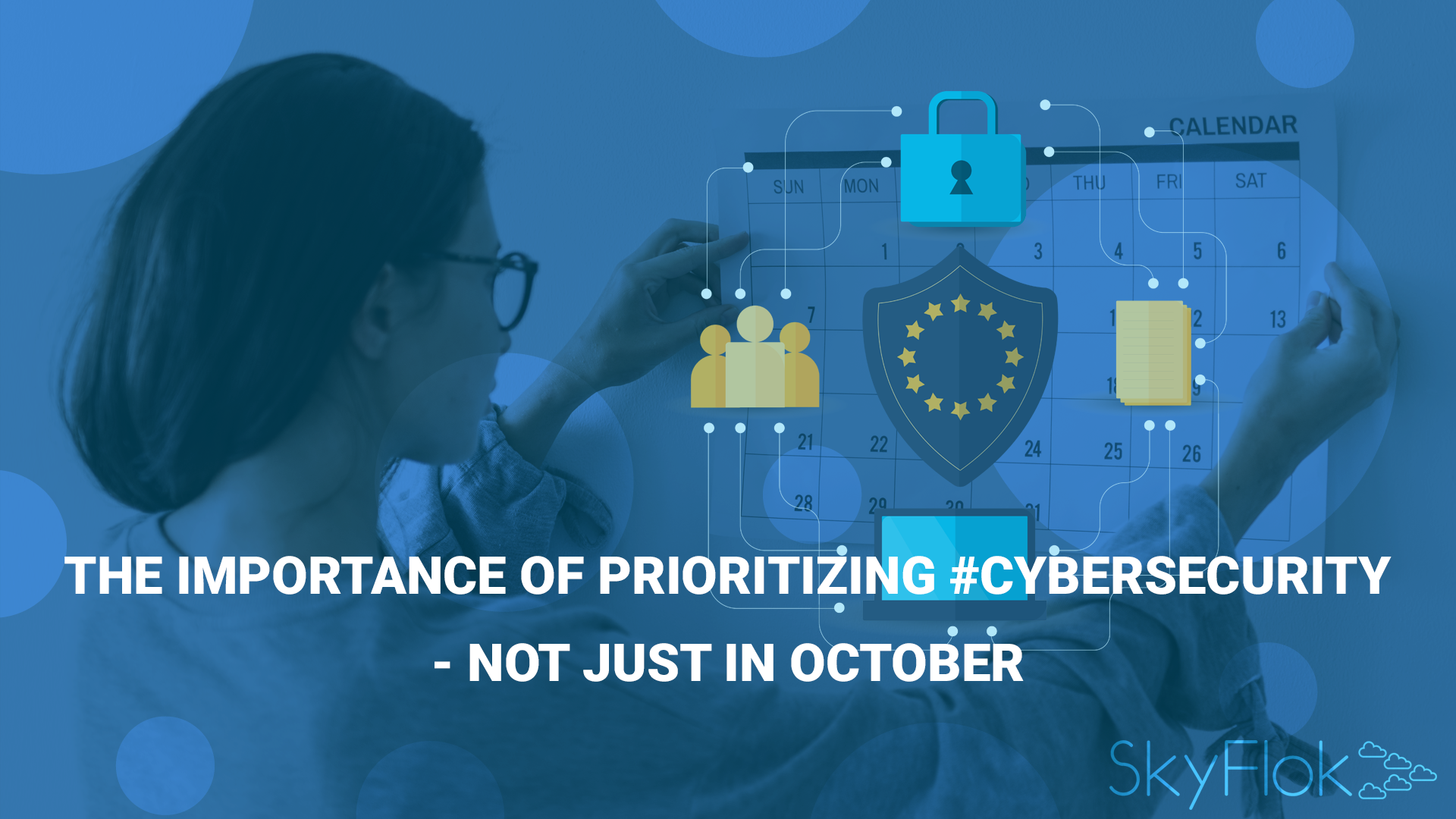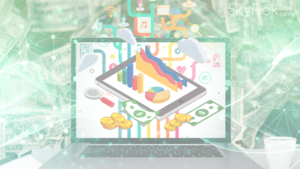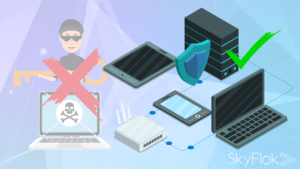The month of October is officially set aside as National Cyber Security Awareness Month. However, data breaches are happening daily throughout the whole year and we definitely need to prioritize cybersecurity not only in October.
At SkyFlok we take cybersecurity very seriously. We use innovative technologies to increase data privacy and reliability and allow you to share data securely with your colleagues and clients.
Take your cybersecurity to the next level and protect your valuable files with SkyFlok.
The month of October is officially set aside as National Cyber Security Awareness Month. Throughout the month, the theme for the holiday emphasizes the importance of “Stop. Think. Connect.” The message encourages individuals to take security and safety measures, understand the consequences of their behaviors online and to enjoy the benefits of online connection.
Several technology leaders have reflected below on the necessity of an IT security team, and the importance of building a strong cybersecurity strategy throughout the year.
“Today’s connected world is full of security threats and vulnerabilities. Unfortunately it’s a natural tendency to overlook just how dangerous hackers, ransomware, phishing and viruses can be. When you buy a bike you should purchase a helmet for safety and security just as IT pros should be purchasing the right protection for their technology. Equally important is to have a second line of defense in place when the inevitable does happen. During this National Cyber Security Month, organizations should consider investing in archive storage – it’s a stable, reliable solution for storing data on a central, secure repository, both at home and at work. My advice for IT pros navigating through the modern technology world would be to buy your protection, put on your helmet and enjoy the ride,” said Gary Watson, founder and CTO, Nexsan.
“Health and wellness draw many parallels with cybersecurity. Patients must be proactive with regular checkups– as well as emergency visits or appointments when they’re sick or injured. Organizations that handle sensitive data must implement constant security checks, as well as rapid incident response and triage when needed-whether the attack is caused by an insider threat, nation-state actor or cybercriminal. Those in the medical field must be meticulously detail-oriented, constantly studying and quick to react to new illnesses and injuries they’ve never encountered before to cure their patients and help them thrive. Cybersecurity professionals must have the same dedication and fast reaction time to protect their businesses and customers’ data. And it’s time they get some recognition.
October is National Cybersecurity Awareness Month (NCSAM), a time to appreciate those already working in the field that makes this data protection possible– and to highlight some of the benefits for those who may be interested. Positive sentiments around overall job satisfaction, salary and emerging technology show why cybersecurity is a great field to work in – on top of the fact that you get to play a role in keeping important information out of adversaries’ hands.
A recent report revealed that 80 percent of those in the field feel secure about the future of their jobs, identifying the most satisfying aspects as: always learning something new, defending companies and catching threats and working with extraordinary people and teams. And the salaries help- the median range is $75,000 – $100,000 per year, with 34 percent earning more than $100,000. They get to work with cutting-edge technology on a daily basis-with most professionals finding endpoint detection and response (EDR), user behavior analytics and artificial intelligence (AI) to be the most helpful in pinpointing cyberthreats. Plus, 75 percent agreed that advances in machine learning and AI can make their jobs even easier-with adoption increasing each year. Does this all sound exciting to you? Current pros recommend new grads continuously learn new things, pursue new certifications, partake in internships and perhaps, most importantly, do what you love.
This NCSAM, we hope consumers and businesses continue to educate themselves, cybersecurity professionals can take stock and be proud of their work, and those interested in the field begin to take the steps needed to enter and excel in it.” – Stephen Moore, chief security strategist, Exabeam
“More than ever, cybersecurity is a moving target, and staying ahead of the curve is a challenge. When you go online, it’s a simple fact that you are putting your personal data at risk. Breach Level Index found that more than 3,000 records are stolen each minute, which translates to more than 50 records each second. Even further, the recent Facebook hack affecting upwards of 50 million accounts has proven that user data is always vulnerable.
This October marks the 15th annual National Cyber Security Awareness Month (NCSAM). What began as a collaborative effort between government and industry has possibly never been more relevant than now, serving as an apt reminder to us all to not only be more conscious of cybersecurity threats, but how we as individuals and businesses can proactively mitigate cyberthreats. No one wants to be an easy target, so here are a few security strategies to help organizations stay ahead:
- Be proactive and build applications with security in mind every step of the way. It may take a bit more time or cost a bit more money, but it’s a solid investment to prevent media embarrassment and loss of trust from your users and the public at large, all of which will negatively impact your business. Be extra careful when using other social media logins for federated identity or SSO code.
- Encourage employees to not reuse passwords. If a username/password pair is leaked in a data breach, attackers will try these credential pairs on many different web services. If you use the same password for multiple services, this is one of the easiest ways for your account to become compromised.
- Don’t wait to remediate your vulnerabilities. It’s better to be safe than sorry. Patch all vulnerabilities no matter how small the possible damage might be,” said Jeannie Warner, security manager, WhiteHat Security.”Recent cyberattacks on major companies like Facebook, Instagram, British Airways and more have proven that the threat landscape is becoming even more complex and sophisticated. In fact, the US Signal 2018 Security ‘Health of the Nation’ survey, revealed that 81 percent of organizations witnessed an increase in cybersecurity challenges in the past year.On the 15th anniversary of National Cyber Security Awareness Month, it’s important think about how your organization can work to prevent and mitigate cyberattacks. A few key strategies include:
- Know your data and your weaknesses: Document this information as your starting point for ensuring the security of your data and IT systems. This will help you identify your IT systems’ vulnerabilities, so you know where to focus your security efforts.
- Get defensive: Up-to-date firewalls, ad-blockers and script-blockers in browsers, and email security products can block known malicious senders and strip known malicious attachment file types.
- Employ strong password security: Everyone in your organization should use strong passwords, making them as long and as random as possible.
- Seek out support. Not every organization has sufficient internal resources to manage their numerous security and IT tools. Solution providers often offer a team of experts to support the implementation and monitoring-take advantage where you can!The bottom line is companies must invest in the right talent and solutions to meet strict regulations like GDPR and defend against threats to secure themselves for the future. NCSAM is the perfect time to refresh security strategies and reinvigorate employee knowledge,” said Matt VanderZwaag, director of product development at US Signal.“National Cyber Security Awareness Month is a good opportunity for businesses to reflect on the systems in place to protect the security of data at rest and in transit. Using data automation solutions can help reduce the risk, time and cost of deploying changes to, and updating data offered within your data infrastructure. By limiting or negating the need for manual input, which can better protect against security vulnerabilities. In addition, the use of data automation software to conduct repetitive development and deployment tasks frees up IT staff to ensure the data infrastructure is delivering results with security top of mind,” said Neil Barton, CTO, WhereScape.”Despite the best efforts of the global IT community, cybercriminals continue to make their way into what many believe are secure networks. The fact is that when it comes to IT security, our businesses, organizations and government agencies remain outmatched by hackers who are becoming bolder and more sophisticated. Even while the network security industry introduces more effective detection and defense solutions, the traditional “fixed perimeter” based approach to network security is quickly becoming obsolete. My advice this National Cyber Security Month is to recommit to trusted security practices while adopting new approaches that leverage wireless, software-defined and cloud technologies. This is especially important as we move into the era of the Connected Enterprise and the need for more agile and pervasive networks,” said Todd Kelly, chief security officer, Cradlepoint.”The increased severity of security breaches due to cybercrime poses a strategic challenge for federal and state security services. Increasing efficiency and speed, controlling the means of communication used by hackers, but also, and above all, anticipating the lead-up to such actions, are all challenges that persist. In this mass information age, the ability to surface information and insights from huge volumes of structured and unstructured data is absolutely crucial in stopping hackers. This National Cybersecurity Month, companies should look for tools such as cognitive search and analytics technologies that surface patterns and relationships along topical lines across disparate silos of information. Being able to analyze and extract key information in the fight against cybercrime as quickly as possible will revolutionize the work of organizations mobilized in this struggle,” said Scott Parker, director of product marketing, Sinequa.
“It’s typical that when an organisation thinks of cybersecurity, it often looks to firewalls and intrusion detection software first. Yes, protection is important; however, in a culture where attacks and downtime are no longer a matter of ‘if’, but ‘when’, these precautions are not enough. Organizations also need to be prepared for what happens after a disruption, and will be judged not only on keeping people out and data safe, but also on how quickly they are back to functioning as normal – how resilient they are.
In a recent survey conducted by IDC, 93% of companies said they’ve experienced a tech-related disruption, and 79% of those businesses lost money either directly, or through paying for additional recovery expertise.
The US framework for National Cybersecurity acknowledges protection as a key element of any company’s defence, but equally important is the ability to recover. Organizations need robust, comprehensive cybersecurity plans that range from prevention measures all the way to easily accessible, up-to-date backup as part of disaster recovery. Platforms and tools that combine these capabilities and take advantage of the latest technology – like cloud backups and DR sites – empower organizations, in moments of crisis, to have faith in the plans they have set up, support the business in rebounding from an attack and truly prove the resilience of IT,” said Gijsbert Janssen van Doorn, technology evangelist, Zerto.







